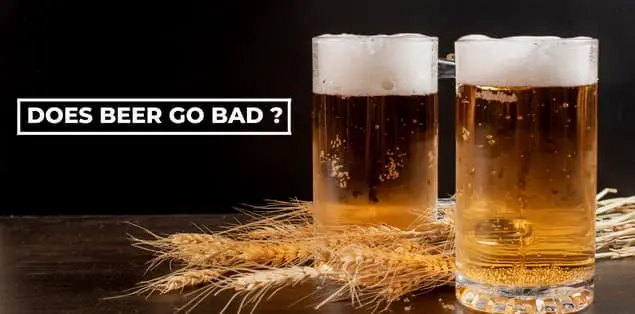Were you aware that in 2018, the U.S. beer sector sold more than 202.2 million barrels of beer in the U.S.? Beer is a global phenomenon, but how can you keep it safe?
We’ve all pondered over the quality of beer after it’s supposedly “gone bad” at some time. Is beer able to go bad? If not, then what happens as the stated expiry date approaches? These are some of the topics we’ll be debating today.
We’re trying to debunk some of these urban legends. The price of alcohol necessitates that beer aficionados, for example, be conscious of what is healthful and good, particularly because alcohol is expensive.
So, without any further ado, let’s jump right into it!
Does Beer Go Bad in the Fridge?
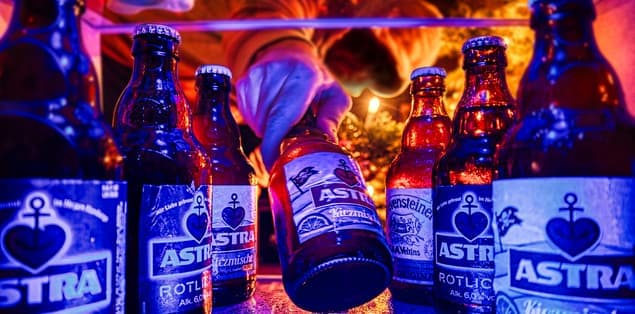
Yes.
But open and packed beer can get spoiled in the fridge. When stored in a cold environment like a refrigerator, an unopened bottle or can of beer has the potential to remain drinkable for up to two or three years.
But, on the other hand, after a bottle or can has been opened, the contents within are often only good for one day before the oxidation process wipes off all of the delicious tastes.
Suppose you often store opened beers in the refrigerator. In that case, you should consider purchasing resealable containers such as growlers or even a beer keg.
This will prevent beer from becoming stale. Be careful to familiarize yourself with the various sizes of kegs so that you do not wind up with a hulking piece of metal furniture due to your lack of knowledge.
Does Beer Go Bad in the Heat?

It won’t harm you, but its taste will become worse.
The beer in your fridge has a shelf life. In most instances, the sooner you drink it at the appropriate temperature, the better it will be for the satisfaction of the drinker. However, you will not ruin the beer even if you sometimes expose it to heat, such as during a journey on a warm day when the air conditioning is off. Nevertheless, this may reduce the amount of time during which it will taste fresh.
The introduction of heat for a lengthy period can hasten the process of oxidation in the beer, which will result in off-tastes. Compared to storage at room temperature or warmer, refrigeration is superior at delaying the onset of this process for a longer time.
At What Temperature Does Beer Go Bad?
There is not a single temperature threshold that, if reached, will cause the beer to taste stale immediately. Instead, the interaction of time and temperature govern this.
The clock on the beer’s freshness starts ticking far more quickly when you don’t keep it in a refrigerator, regardless of whether you keep it at room temperature or a higher temperature. Generally speaking, beer held at 100°F for one week has the same flavor as beer maintained at 70°F for two months or at 40°F for a year.
Every beer bottle contains an estimated “best by” date. This date is the brewery’s best guess as to how long the beer will maintain its crisp flavor if you keep it at a cool temperature. Even beer stored in the refrigerator may get stale if given enough time.
Does Beer Go Bad If Not Refrigerated?
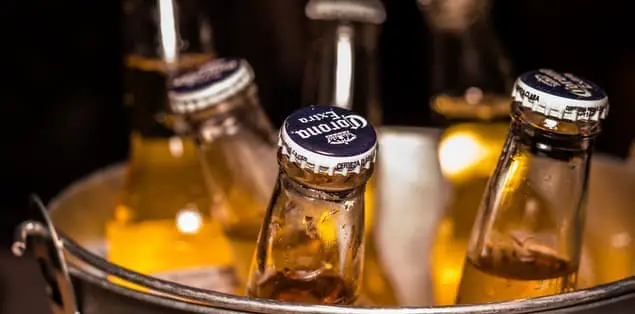
As we just discussed, putting beer in the refrigerator will significantly slow down the natural oxidation process that occurs over time. It is also possible to prevent oxidation by storing beer at room temperature and away from natural light sources. However, this method is not as successful.
Suppose you expose the beer to a temperature considered “moderate,” such as in a garage. In this case, this will not be the determining factor in whether or not the beer is spoiled. Instead, the beer will generate the off-flavors of oxidation much more rapidly than if you had held it in a cooler place when you exposed it to the warmer environment.
Read Also: Does Beer Freeze?
Does Canned Beer Go Bad?
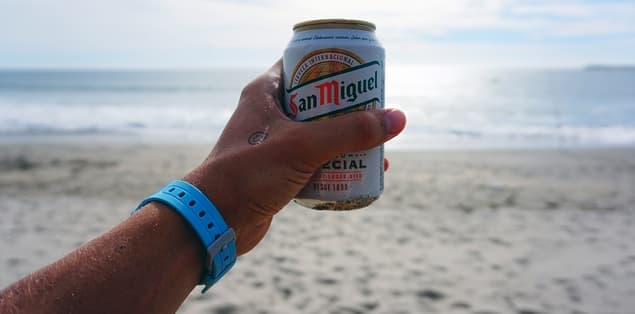
The answer is yes, although the rate at which it happens is often much slower with canned beer than bottled beer. This is because cans do not allow any light to enter, which significantly slows down the oxidation process.
However, you should not expect that a can of beer that is five years old would taste as nice as a new one. Because of this, you should constantly undertake inventory forecasting based on par stock levels to ensure that you don’t end up with a refrigerator full of cans considered dead stock.
Does Ginger Beer Go Bad?
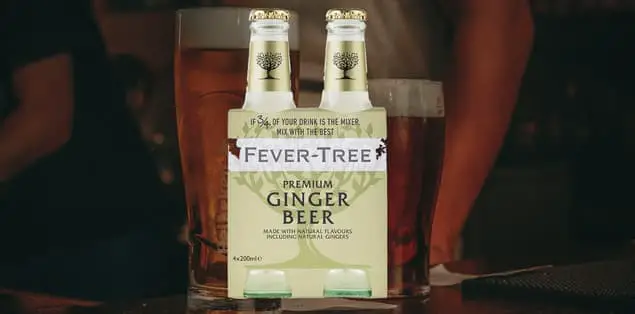
No. Ginger beer doesn’t go bad.
But hold on, why do the wine bottles have a date printed on them that says it has expired or has passed its expiration date? That’s an interesting point to bring up.
The date printed on the bottles is not a sign of how safe the product is but rather of how good it is.
What exactly do we mean when we say this? Although ginger beer does not expire, its quality may degrade over time due to oxidation and other chemical processes.
The rate at which its quality deteriorates will differ based on two elements. They are:
- How well you preserved it
- Whether you opened it or not
When Does Beer Go Bad?
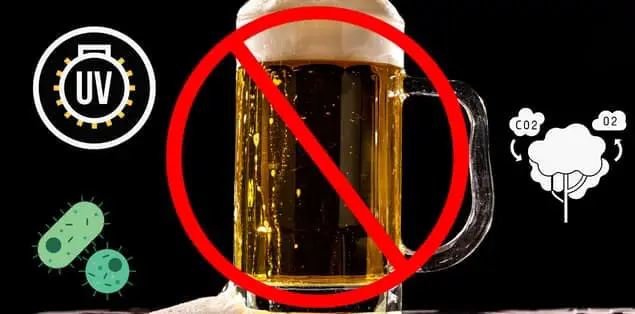
Beer may be affected by a wide variety of factors. Although it is the most popular kind of alcoholic beverage, it is also one of the most susceptible to going bad if it is allowed to sit out unattended.
Keeping an eye on your beer is important if you want it to keep for longer. Even while brewers pay much attention to their product, it doesn’t mean you can’t take a few precautions to ensure you enjoy it to the fullest.
There are three primary adversaries you want to stay away from when it comes to beer. They consist of light, oxygen, and any germs in the area. They despise beer, and their behavior reflects that loathing.
Light
There is a negative impact that ultraviolet light has on beer, just as there is a bad effect that ultraviolet light has on your skin.
It would be best if you didn’t let your beer stay out in the hot sun for an excessive amount of time. In such a case, the ultraviolet radiation will cause a chemical component found in the hops to undergo a reaction.
Hops are what give different beers their flavors and aromas. As a consequence of this, the U.V. rays assault the core of your beer. It gets worse! Because of this response, your beer will become a skunky beer or skunked beer since it’ll take on the aroma of skunk spray. Indeed, this is the rationale for the widespread use of dark bottles.
Oxygen
The process that we refer to as aging is oxidation. Oxygen has the same interactions with various substances as with other things, including beer. It is responsible for breaking down the chemical components, which results in the beer having a variety of tastes.
The beer often develops a taste like butter as a result of the aging process. Oxygen can interact with a variety of other elements, which may result in a variety of tastes. It is even possible that it will have the flavor of cardboard. For example, cups of beer are less susceptible to this issue than bottled beer. These later containers often have a superior seal, meaning that the beer interacts less with the surrounding air.
Bacteria
Microbes are the root cause of everything deteriorating over time, including the physical world. But, to our good fortune, this process is quite slow. The alcohol acts as a natural preservative since bacteria cannot thrive in its presence.
Additionally, microorganisms are more difficult to cultivate in commercial beer. As a result, brewers now have access to more sophisticated equipment, which helps them reduce the risk of contamination.
Refrigerating your life nectar is yet another excellent method for preventing bacteria from growing in it. The cold has a similar effect on their life cycle to the yeast used to make ales.
How Long Does It Take for Beer to Go Bad?
The direct answer to that question is 5-6 months, but the right answer to this question is not that simple.
Most beers are at their peak flavor the day after they are bottled or canned. Brewers are experts in their craft and offer beer that tastes exactly like they envisioned it should. A flavorful, crisp, and delectable beer is a freshly brewed one. However, similar to the majority of other elements of beer, there are many outliers.
The shelf life of more potent beers, such as imperial stouts and barley wines, is much longer. A good number of these beers improve with age, obtaining deeper flavors as they do so. The aging process will also result in the development of exciting new tastes in sour and wild beers. Because manufacturers mix yeast and bacteria in these beers, they develop new flavors over time.
Certain components of a beer’s taste will alter and develop more as the brew matures. Oxygen interacts with molecules in the malt, yeast, and hops, which ultimately results in the enhancement of particular tastes. As time passes, other taste components become less prominent. In most cases, the level of bitterness will lessen as time passes. As beer matures, it will develop characteristics that are reminiscent of sherry.
Does Beer Go Bad If Cold Then Warm?
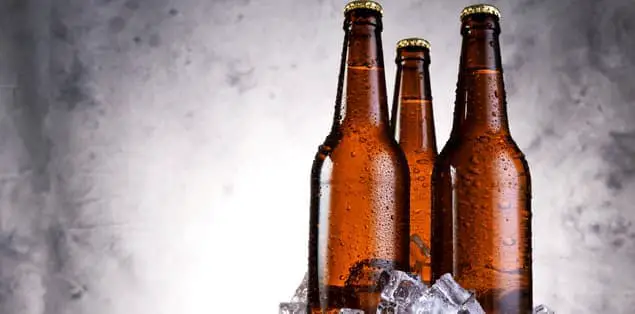
Regarding this solution, we have a few different options available to us. For example, a pack of cold beer may be left out on the counter for a while, where it may even get somewhat warm, then placed in the refrigerator later. But, the beer will go without suffering any significant consequences. But, of course, you won’t detect any difference in the tastes at all. So the level of bitterness and the scents will both be unaltered.
Again, the flavor won’t be affected even if you bring a cold pack of beer into your house and do not refrigerate it once you open it. The beer won’t last as long, but it will still taste the same.
But what happens if the spot where you kept the beer to keep it cold becomes warm? Within only a few days, the beer quality will begin to suffer if the temps remain too high. For instance, malts may get so sickeningly sweet that the taste of certain beers can become similar to that of wet cardboard. In any case, this is not the best possible conclusion.
To summarize, allowing beer to reach room temperature without affecting its quality is OK. Take care not to subject it for an extended time to temperatures that are too high, direct sunshine, or oxygen.
Does Beer in a Keg Go Bad?
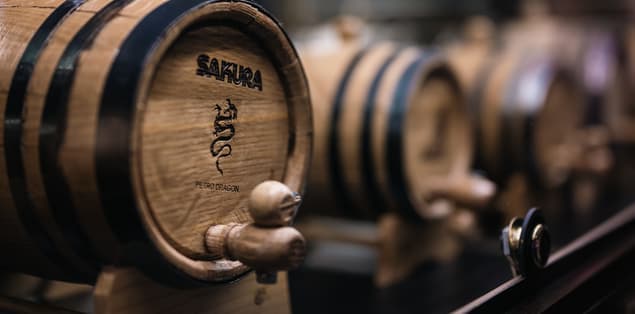
There is no such thing as an everlasting good, and excellent beer is no exception. All beer, regardless of whether you store it in a keg, a can, or a bottle, will ultimately go bad in one manner or another. The best part is that putting your kegged homebrew through the right storage procedures may go a long way toward increasing its shelf life.
Beer stored in kegs is somewhat safe from the environmental factors that are most likely to cause the beer to get stale, but the beer will nonetheless go stale over time. In most cases, a keg of homebrew will stay fresh for up to six months, after which it may begin to develop off-tastes.
However, the shelf life of unpasteurized commercial beer in an unopened keg is only likely to be three to six months. However, the shelf life of pasteurized commercial beer is three to six months.
Whether or not you pasteurize your brew and whether or not you are using a CO2 or manual tap, these things will determine how long the freshness of your beverage will stay. Examining the beer’s fragrance, look, and taste are the three most straightforward ways to establish whether or not it has gone bad.
Read Also: How Many Beers in a Keg?
Does Root Beer Extract Go Bad?
No. Root beer extract does not go bad.
How Long Does Unopened Beer Last?
Beer does not have an indefinite shelf life. Most varieties will maintain their excellent quality for six months when stored at room temperature; however, you may keep them in the refrigerator for up to one year.
You won’t believe this, but some refrigerated varieties have a shelf life extending two years beyond their expiry date. Cans of beer often have a longer shelf life than bottles of beer since less light may penetrate the can. In any event, the taste will gradually lose its intensity.
Your beer will have a lower shelf life once you’ve opened it. Even the one you store in the refrigerator will get stale. The lack of carbonation, which causes the stale flavor, is the explanation behind this. The only exception to this rule is some vintage and artisan beers designed to be aged. It would help if you didn’t drink it fresh since the taste won’t be at its peak until it has aged in a cellar for a few years.
Remember that some manufacturers may use the “best-by” date. In contrast, others will use the date the bottle was bottled. However, when it comes to vintage beer, you should seek information on how much time it needs to mature before producing the optimum results.
Can You Get Sick From Drinking Old Beer?

If you drink expired beer, it may not be hazardous to your health, but there are no trustworthy sources to support this conclusion. However, a nasty taste on your tongue is the most common side effect of eating anything contaminated with bacteria. the beer will taste sour.
To defend against infections, it is a fermented beverage with a low pH that includes alcohol.
The exception is when a brewery’s equipment is unclean and polluted by a manufacturer. For example, an unclean beer might make you feel sick since bacteria have contaminated it.
When drinking an unpasteurized beer beyond its expiration date, you should also be aware of the dangers. Throwing it out is always preferable to drinking it and putting yourself in danger.
Final Words
Fresh beer always tastes better. However, this does not obligate you to consume the whole 24-pack in a week. Beer has a long shelf life when properly stored. Experimenting with aged beer is also much fun. You need to store beer properly because it is very common to see beer expire. Even if you have packaged beer, it will go bad.
It is very essential to know how long does beer last.
Keep these tips in mind, and you should always have cold enough, excellent beer on hand.
